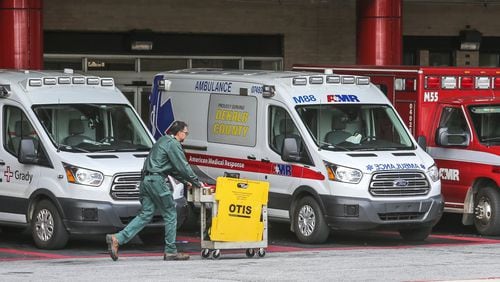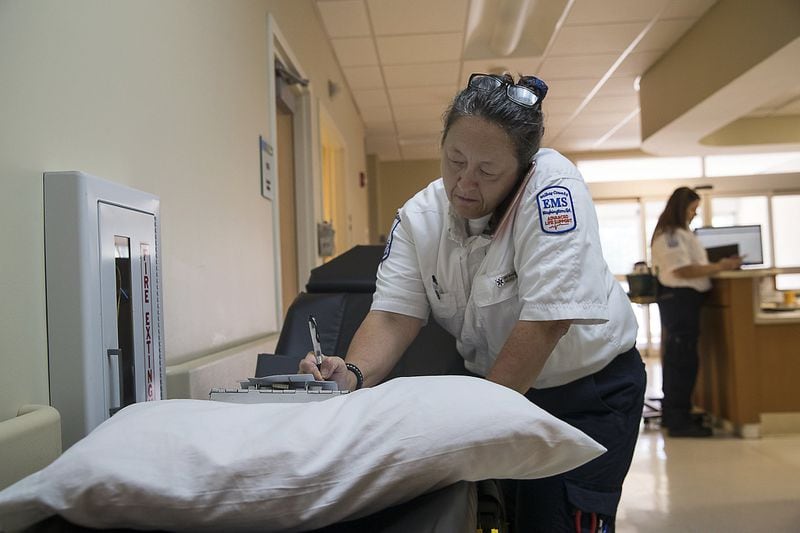Some of Georgia’s most influential leaders in emergency medical services, as well as patient advocates, are pushing for more dramatic reforms to a state proposal affecting the hiring of ambulance providers.
The proposal, expected to take effect Dec. 9, is a first step to EMS reforms that are long overdue, said Bud Owens, chairman of an advisory committee of state EMS leaders that makes recommendations to the state.
But he and others also believe the revision is not enough to block potential abuse in the hiring of providers and to ensure the standard of care provided by emergency medical services. They say that the state needs to provide better oversight and develop standards to hold providers accountable.
The proposal is the state’s response to concerns by the groups that ambulance providers and their representatives have had undue influence on state regional EMS councils, leading to decisions that were not in the public interest.
Under its key provisions, the proposal will require the councils, which evaluate and hire EMS and ambulance providers, to conduct business in public, as stipulated by the Georgia Open Meetings laws. The revision also will require council members to disclose any potential conflicts of interest, and refrain from voting on contracts when those interests could compromise their decisions.
“I believe we all have to conduct our business appropriately to make sure we’re making decisions in the best interest of those we serve,” said Owens, who is also a county commissioner in Gordon County, in northwest Georgia. “If we can’t handle the business end of it, I don’t think we should be handling the patient care.”
Those changes won’t be enough, though, to ensure that those with life-threatening emergencies receive they care they need, other critics say.
Across the state, too often ambulances have been slow to arrive. Because of the delayed response or substandard care, some critically ill Georgians have died, said Elmer Stancil, an Atlanta-based attorney who represents the Georgia Ambulance Transparency Project, a group formed last year to push for reforms in EMS.
Those losses “illustrate the profound consequences and real human devastation when the state neglects its duty to ensure quality emergency medical care,’’ Stancil wrote in a Nov. 6 email to a lawmaker and state officials, which was obtained by the Atlanta Journal-Constitution under the Georgia Open Records Act.
“That’s really what’s at stake with this rule revision: the lives and welfare of real Georgians,” Stancil wrote.
In June, an AJC examination found that state has operated for years with vague standards and weak oversight. In most cases, the Georgia Department of Public Health, which oversees the state's EMS system and ambulance providers, leaves it up to ambulance company officials to determine the quality of care provided by their medics and to investigate complaints.
It also leaves it to regional councils to recommend ambulance providers. But the department does not share with the councils, or the public, the reams of performance data it has on ambulance providers, based on detailed patient care reports and response time. As a result, many hiring decisions are the result of recommendations that have no substantive data to back them.
Even EMS leaders say they have tried for years to wrestle data from the state to no avail.
“I can’t review anybody if I don’t have the data as to what they’re doing,’’ said Courtney Terwilliger, EMS director in Emanuel County and a member of the state’s EMS advisory council. “The only people who have it is the state office of EMS, and they are notorious for not providing it.”
The ‘bad guy’
Just how far the state EMS office may go to impose stricter regulations remains to be seen.
But it appears the office is leaning toward providing more legal guidance to help the councils identify when conflicts occur and stepping up enforcement to make sure they are avoided.
David Newton, who became the state’s EMS director early this year, announced just last week to Terwilliger and other members of the state’s EMS advisory committee that his office plans to continue efforts to develop uniform council bylaws.
The new bylaws, which would be adopted by next summer, would set standards for voting, managing conflicts, membership limits and terms, frequency of meetings, recording of minutes and other housekeeping, Newton said.
“We want to create uniformity in the membership of each council,’’ Newton said. “The language has to be verbatim and copied to the bylaw of each council.”
The state also plans to eventually include a provision in the bylaws that was removed from the current proposal despite EMS leaders, as well as officials from the Association of County Commissioners of Georgia, saying that it was vital to EMS reforms.
That provision would limit the number of representatives from any one organization on the councils.
John R. Graham, the chairman of EMS Council Region 6, has also recommended that ambulance providers make up no more than than 10 percent of the councils.
The fire chiefs in the north Fulton cities of Sandy Springs, Johns Creek, Milton and Alpharetta have offered a similar proposal. They call for establishing regional authorities made up largely of the municipalities they serve.
“These municipal stakeholders are the people best equipped to evaluate the rapidly changing needs of a unique region …” the fire chiefs wrote to the state.
Others echoed that representatives of taxpayers should also play a role in the council decisions.
“It is important that ambulance executives and anyone standing to benefit financially not be given too much influence,” Patty Durand, a consumer advocate in Atlanta, wrote to the state.
State officials note that if the membership of ambulance executives on the councils is restricted, then the state will have the authority to enforce the restriction. Under current law, county commissioners decide who serves on the councils.
“The bad guy has to be us,” Newton said.
Performance standards
Some EMS leaders also want the state to include in its rewrite of the bylaws a measure that will allow each council to develop its own standards and use them to evaluate the performance of ambulance providers.
“We felt it would be a better choice to allow the regional councils themselves to develop those performance measures and how they are going to be utilized,’’ Heath Williams, deputy chief of Barrow County Emergency Services, told the AJC.
The fire chiefs of several cities in south Fulton also have asked the state to set a baseline for the number of EMS resources that should be devoted to communities.
That way, they said, local governments can exercise greater control over service agreements with ambulance providers and can hold them accountable as to the number of units that must be dedicated to advanced life support.
Sam Rafal, a member of the Georgia Ambulance Transparency Project and a former EMT in Athens, sees that change as vital. It is an outrage, he said, that the state does not demand that providers act first to meet the needs of patients who have life-threatening emergencies. Providers may shift resources to non-emergency calls, which are more profitable largely due to federal reimbursements. So, if someone has a serious emergency, no ambulance may be able to respond, he said.
“This is not OK,’’ Rafal said. “We’re not going as far as we need to go as far as protecting the integrity of our EMS system.”
Less likely would be a move to set a state standard on response times. State officials say state standards are unrealistic because of the geographical, traffic and population differences of the communities served by the regional councils.
Ambulance providers also believe it’s unfair to hold them responsible for long waits that can be attributed, at least in part, to local government dispatchers that are outside of their control, Terwilliger said.
Even so, some standards need to be developed to hold EMS providers accountable, he said.
“We need to figure out those things and be able to say at the end of the day, it’s not about the numbers,” he said. “It’s about getting there to take care of a patient in need of care, and if there’s a block in the system that’s slowing it down, we need to be able to identify it.”











